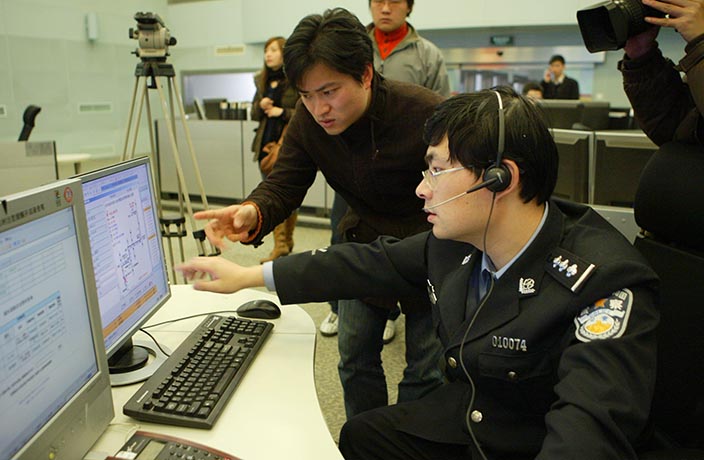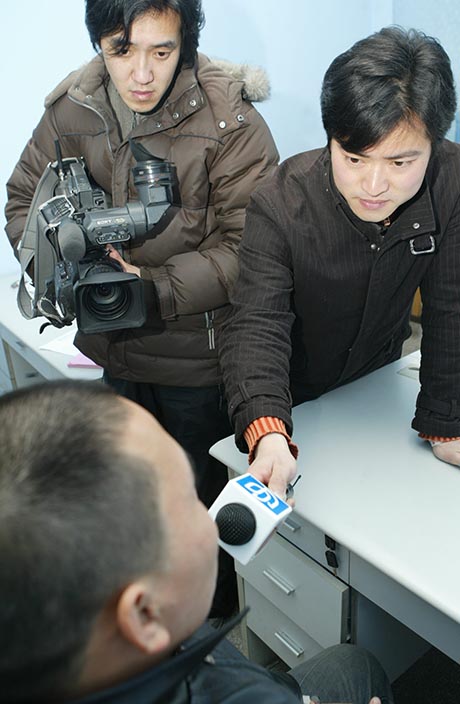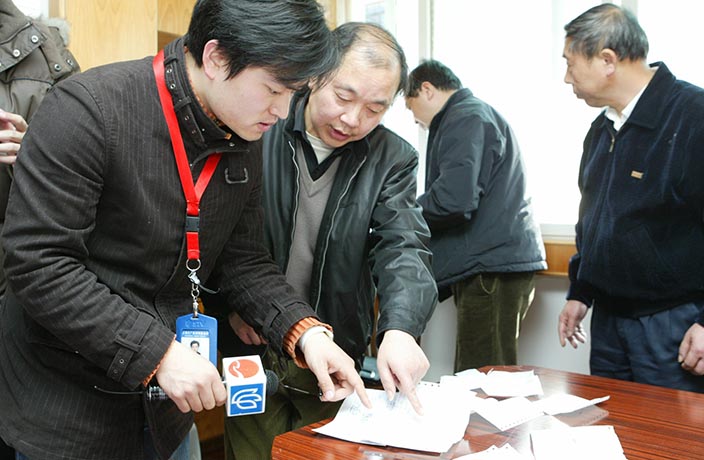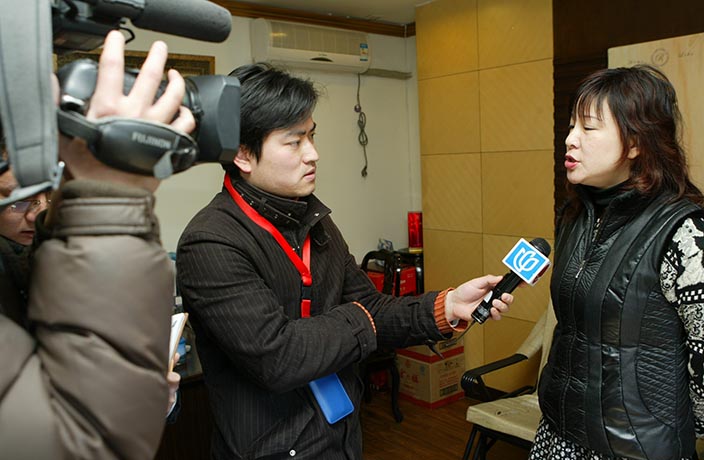Throwback Thursday is when we trawl through the That's archives for a work of dazzling genius written at some point in our past. We then republish it. On a Thursday.
By Ned Kelly and Raemin Zhang. Photos by Nicky Almasy.
The day starts as expected – with the unexpected. At 8.40am the call comes from Xuan Kejiong: “There is a fire in Jiading, we need to rush to the site.” We hurry to the huge beige behemoth of a building on Weihai Lu that is home to Shanghai Media Group, producers of Little Mr. Xuan On The Scene, a nightly SMG News Channel round-up show that is watched by millions, making Xuan Kejiong a household name and one of the most recognizable faces in the city.
Walking past the electrified fence, Xuan waves us through the security checkpoint and into a waiting white Santana, emblazoned with the SMG logo breaking news hotline number, in which his two man team of driver and cameraman sit, raring to go. No sooner are we seated than a frantic dash across the city begins, with some white-knuckle weaving in and out of traffic on the elevated highway that would leave even the most hardened taxi driver with his heart in his mouth.
“One gambler was so desperate to escape being caught on camera he jumped from the building and died.”
Xuan graduated from the news department of Fudan University in 2000, he tells us, and joined the TV station soon after. He was assigned to breaking news by chance, or fate as he looks on it now, “It was destiny, breaking news journalism has become my passion and life.” A little too much so for his wife’s liking, he goes on to explain, “I took one day off a fortnight for seven or eight years, which made my wife very angry at me. I often leave the home in the middle of the night to chase a story.”
Last year he got promoted to head of the news department, which allows him more time off, but he is in no hurry to take himself off frontline duty. And his dedication to get the story is as strong as ever, as evidenced by his actions at the Jing’an building fire of November 15. The intense heat of the flames had warped his camera, trapping the film inside. Xuan simply took the camera and smashed it on the floor, retrieving the film. The move was caught by a rival news crew camera, only adding to his reputation.

“Now we go to the factory front gate,” Xuan announces. On seeing the car the guards swiftly bring the barriers down to block entry. Undeterred, Xuan and the cameraman get out of the car and try and communicate with the guards, who are reluctant to talk, offering little more than a reticent shake of the head. “Well, it happens,” explains Xuan. “In most cases of emergency reporters are not welcome to get inside and ask questions. Let’s try the side gate.”
Driving along the outskirts of the factory we literally follow our noses to the scene of the fire, the smell of burning plastic leading to a blackened, soot-stained five-storey section of the building that still smolders. Xuan and his cameraman get out and take a few more shots. “It is not a big fire, nobody got hurt, but after this I’ll call the environment protection department to see if it has had an effect on the air quality in this area.”
"Hurry! We’re driving to Fengxian District - there was a traffic accident there last night and someone is dead,” Xuan cries to his driver, after receiving a phone call while still shooting the smoking factory. We jump in the car and begin a breakneck drive from the northernmost reaches of the city to its very south.
So how do they find their stories? “There are four main ways,” Xuan says. “The show itself has been running for 40 years, so citizens call the hotline number and we collect firsthand accounts. We also exchange information with other members of the media working for different outlets. We have contacts in all the emergency lines, including 110, 119 and 120. And these days the Internet is a useful resource for information.”
So what is it that motivates him? “I believe the news reporter has a social responsibility and the ability to push forward society’s development,” Xuan says. “Although my reports are objective, I believe by attempting to present the facts and the truth in my reports, they can make a change in many situations… a change for the good.”

That is not to say they should just charge into any situation, he believes. “Not long after I started I was on a story to expose an illegal gambling ring,” explains Xuan. “One gambler was so desperate to escape being caught on camera he jumped from the building and died. Later I found out that the guy was the brother of a high school classmate of mine. That totally shocked me and brought many reflections to my mind. The lens of the media has the ability to exaggerate many things, including small mistakes. As journalists we need to always be careful to respect the people who are featured in our reports.”
Finally we pull up at a barren, dilapidated, cracked-concrete parking lot full of scrapped vehicles. After a brief interchange with the manager we are led to the car from yesterday’s traffic accident. A crumpled ball of twisted metal, the engine is completely exposed and fresh blood and broken glass are everywhere, the detritus of death. Xuan walks straight over and starts sifting through it all like a detective.
“Sometimes I see three dead bodies a day. It is very common for me to see unpleasant scenes, even someone dying in front of me. Life is like this, life goes on,” he says matter-of-factly, lifting a blood-stained leather shoe and then a business card from the wreckage. “OK, here it is! The victim was a tea taster surnamed Wu,” Xuan reads the card out to his colleague.
After talking with to the parking lot manager, Xuan learns the details of the case. “Yesterday evening at around 10pm the victim was driving down the road when a container truck suddenly changed lanes, hit him and forced his car into the river,” he says pointing to a container truck nearby with a damaged front grill. “Sometimes life is just like this, you don’t do anything wrong, but you suffer from someone else’s mistake,” Xuan says in a low voice. “Let’s get out to the crash scene.”
“When we arrived 60 to 70 construction workers surrounded us shouting, ‘Get the f*** out of here! Break the camera! Beat them!’”
After stopping at a petrol station and asking the attendant for the exact location, the car pulls over at a crossroad. There is a small river and broken off piece of bumper hangs from a bush. “Looks like this is the scene,” Xuan says. The cameraman shoots the crossroad for a few minutes, and then Xuan tells us that is it for now and suggests we break for lunch. “My job is unpredictable and very flexible,” he explains, “I never know when or what the next task will be, they all happen suddenly with no preparation.”
We get the call at 3.30pm. “A murder case,” Xuan says with his usual worried voice. “A 50-year-old son has killed his 70-year-old mother.” We drive to a nondescript local compound only to discover from the guard and residents that the incident also actually happened yesterday evening, so no murderer or victim are to be found.
Approaching people living in the neighborhood, none of them are willing to do an interview. “Ordinary people are normally shy in front of the camera, that’s understandable,” Xuan says. “And many worry the interview will have repercussions or bring them problems down the line. I would say around 70 percent of people are very negative doing an interview in cases such as this.”

Abuse like that is not rare, Xuan says. “Another time my three man team and I went to report on a bridge that had collapsed, but when we arrived 60 to 70 construction workers surrounded us, not allowing us to walk any further or shoot anything. Many of them were shouting, ‘Get the f*** out of here! Break the camera! Beat them!’ Can you imagine it? I was totally stunned, too scared to remember anything. In the end we had to dial 110 and get the police save us from the chaos.”
So why continue to expose himself to such danger? “Joseph Pulitzer said, ‘A journalist is the lookout on the bridge of the ship of state,’” Xuan says. “I believe that as journalists we not only record history, but also change its course. During my 10 years of working I have seen people learn from our reports and become more knowledgeable about what is happening around them because of it. And through this, positive changes can gradually be made to society.
“Reporters from my generation and younger generations come and go quickly in this industry, and I understand that – I understand people can’t sustain the lifestyle and the pressures that come with the job. But to me it is so important, that sense of social responsibility, to make changes and to push society forward.”
This article first appeared in the January 2011 issue of That's Shanghai. To see more Throwback Thursday posts, click here.






















0 User Comments